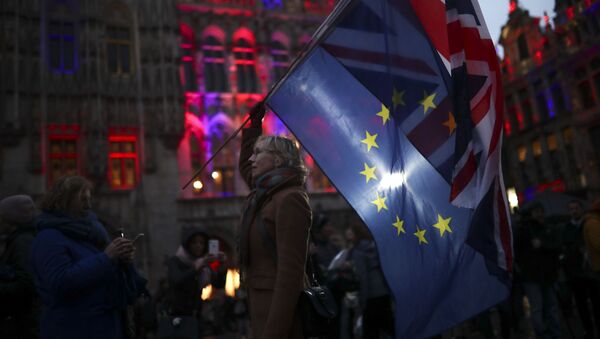The UK and the EU have agreed to “dial down the rhetoric” over Brexit in an effort to prepare the ground for a trade deal as the sides are set to come up with legal texts of their negotiating positions next week.
Diplomatic sources cited by The Guardian stated that both sides have agreed to “lower the temperature” to sit down and scrutinise the texts to better assess the differences in their stances.
According to one insider, “the moment you see the legal texts, that’s when you see how good or bad things really are".
On Thursday, the UK and EU announced in a joint statement that “given the latest COVID-19 developments” they had decided not to hold the scheduled talks in London, adding they are looking for “alternative ways to continue discussions, including if possible the use of video conferences".
Although the coronavirus flare-ups have largely overshadowed the Brexit talks, as many as four areas have been identified as the perennial stumbling blocks for progress in sealing the deal – fisheries, crime, justice, and Northern Ireland.
On the latter point, the EU has clarified that it is up to the UK to create a plan to implement the so-called special terms, including a trade barrier in the Irish Sea, with the country expected to put forth the first proposed arrangements to this end by 30 March at a EU-UK joint committee meeting.
As one source cited by The Guardian put it, “the ball is now in the UK court", as the sides appear to be zeroing in on different goals: the UK obviously prioritises sovereignty issues, while the EU is more concerned about the economic interest of member states.
Fisheries are believed to be a demonstrative case, as London is rooting for its ultimate control over the waters off its coastline, while the EU is calling for a well balanced economic partnership in the field.
Both sides are expecting a major battle over fisheries, which comes as one of the least economically important areas of trade but the one that “wins or loses election", the insider pointed out.
With the UK poised not to make any concessions vis-à-vis the 31 December deadline for trade arrangements, insiders say the divergence in interests may be used as a means to “create the tension to force a deal".
“You have limited time, you are in the worst possible scenario as a rule-taker and money-giver, so extending the transition period is not politically sustainable. So what do you do to achieve a deal? You dramatise it enough to create the tension to force a deal", one source said.
On Wednesday, Michael Gove, the chancellor of the Duchy of Lancaster, told MPs there would not be an agreement on REACH, the EU body that governs chemicals, as well as dimissed suggestions that the UK should remain involved with the European Chemicals Agency (ECHA).
The high-profile Cabinet minister made it clear that the government was not objecting to divergence on REACH rules, telling MPs that “one of the problems is that it involves the European court of justice”.
Just Months Ahead of Post-Brexit Trade Deadline
The UK, which formally divorced the European bloc on 31 January, is currently seeking to ink a trade deal with its EU partners, with the time framework spanning no more than 10 months, until the transition period ends.
Britain's position is that it will break free of EU rules entirely, despite seeking an agreement regarding trade areas, including access to fishing waters and European Court of Justice jurisdiction.
Meanwhile, per ex-Chancellor Philip Hammond, the December deadline could be postponed as governments are all absorbed by the coronovirus outbreak and anti-COVID 19 precautionary measures.
"If the virus starts to disrupt everyday life... and many other processes have slowed down as a consequence, there is no reason to think that Brexit trade talks will be immune, then the parties will have to work together in good faith to decide how to manage that", he said.


